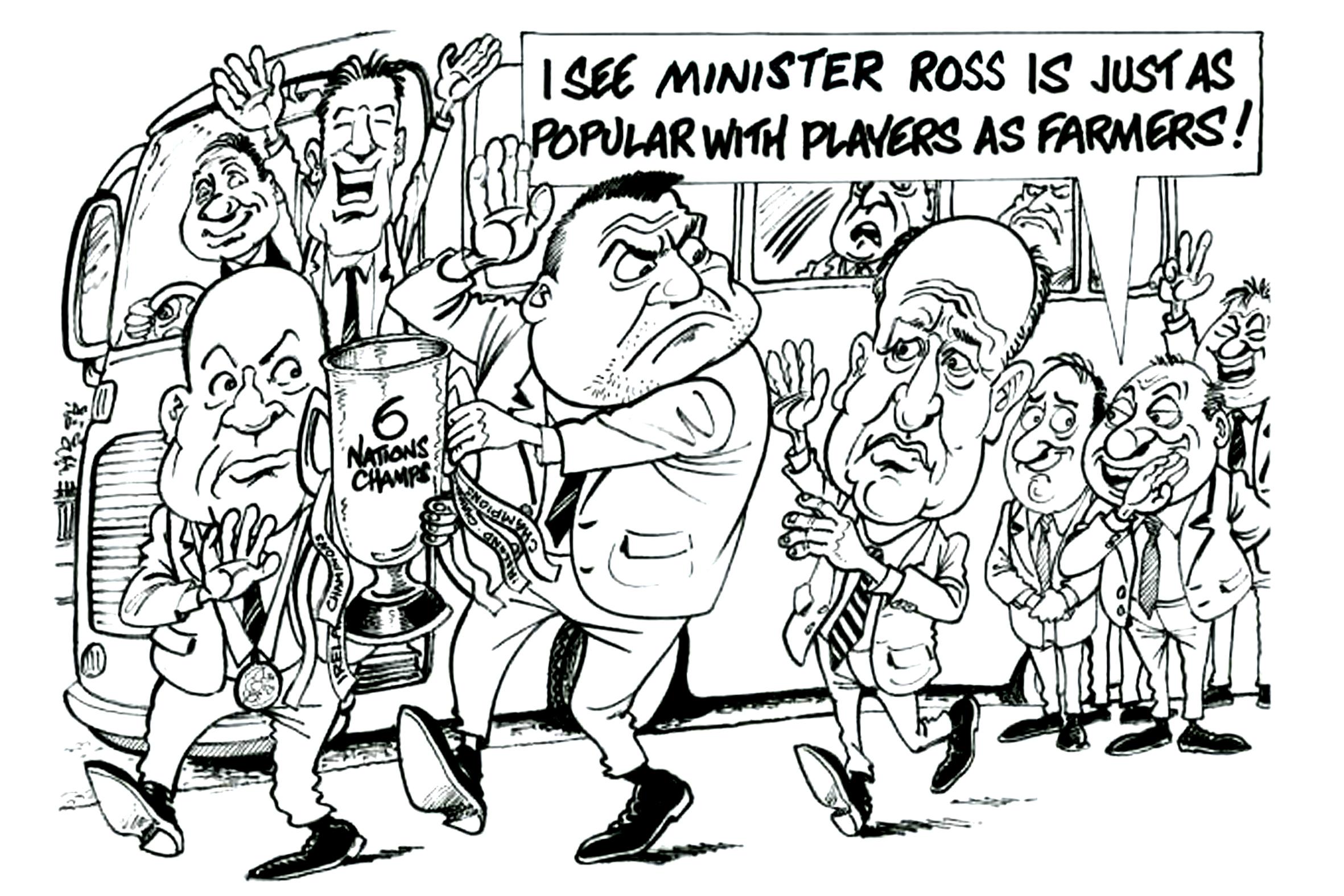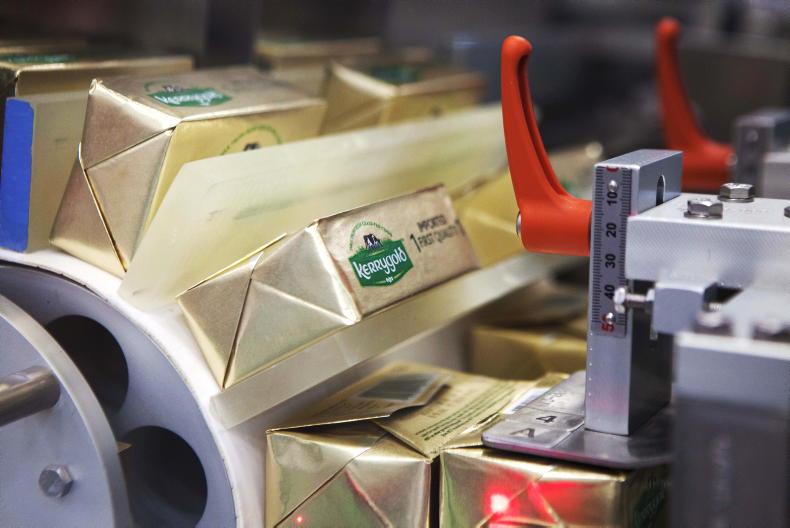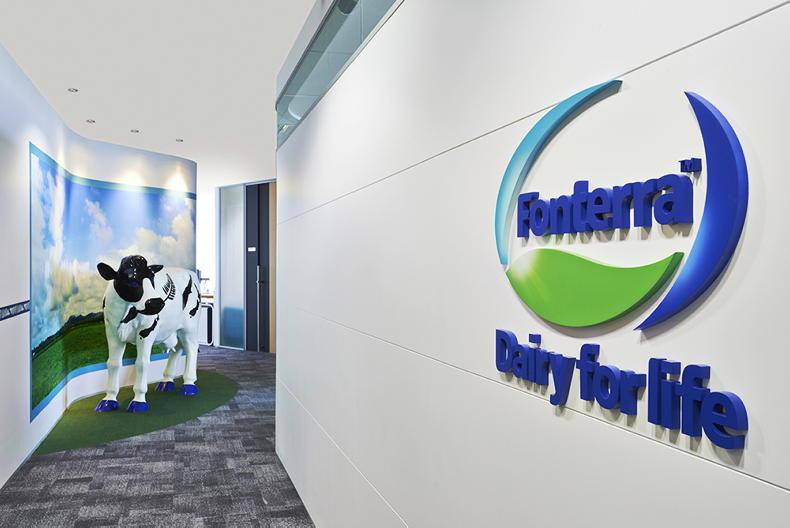During Kevin Lane’s eight-year tenure as the head of Ornua, the business underwent major reform. Lane made no secret of the fact that despite its cooperative structure, he wanted to run Ornua with a plc mentality. He recognised that being able to offer a competitive product price – while at the same time achieving profit growth and returning strong dividends to members – was key to ensuring that Ornua remained relevant.
Maintaining this relevance was a central plank to his growth strategy as it ensured Ornua was a financially attractive vehicle through which Irish co-op/processors could trade product.
As Lane steps down from the CEO position, the volume of product traded through Ornua has reached a record level, nearing 340,000 tonnes in 2017. While the volume growth is not surprising given the expansion in the national milk pool, it is telling that over the past five years, the percentage of Irish dairy products traded through Ornua has increased.
Impressively, the growth in volume has not come on the back of reduced profit margins. As Eoin Lowry reports, margins increased to 2.6% for 2017, with the business targeting 3% in 2018. This profit margin was achieved in 2017 while still managing to pass back the equivalent of 99.1% of the benchmark LTO (Dutch milk league) price to Irish processors – pointing to the fact that margin growth is being driven by efficiencies and higher-end product prices.
Irish butter attracts a premium price abroad through the Kerrygold brand; in Ireland, we have one of the lowest butter prices internationally
Interestingly, despite the hot butter market in 2017, the strong performance of the Kerrygold brand indicates an ability to push higher prices back to customers without affecting demand. The growth of the brand in its core markets of Germany and the US continues at pace, with double-digit growth in both regions last year.
While Lane had an element of luck on his side with the reinvention of butter, and in particular butter produced from grass-fed cows, success is never guaranteed, particularly in the US market. We only have to look to the challenges being faced by Greencore and Aryzta to get a sense of how difficult it is to crack the US market.
Kevin Lane can sign off confident that he has strengthened Ornua, but his departure serves as a useful juncture at which to look at what the future holds. With the business securing record levels of performance, it would be easy to become complacent and assume that past successes will safeguard the future.
However, the Ornua model continues to be vulnerable in a number of areas that will need to be addressed if the growth of the past five years is to continue. One clear area of concern has to be around supply of product. Perhaps one of the most positive headwinds enjoyed by Lane was the wall of milk that hit the industry post-quotas. When growth in output starts to reach a more normalised level, will members start to look to add value to their milk pool internally? Such a move could challenge Ornua from two sides: reduce the milk pool available and, more seriously, potentially create new Irish competitors on the international market – a scenario that we understand was close to developing at one point in 2017.
It is logical that some of the larger processors would see an opportunity to go it alone on international markets. However, is this in the best interests of Irish farmers? Perhaps the best answer is to look at how Irish butter has performed internationally over the past 12 months, where it has been channelled through one entity, compared to its performance in our domestic market, where Irish processors compete with each other. In international markets, Irish butter attracts a premium price through the Kerrygold brand; in Ireland, we have one of the lowest retail butter prices internationally. The same argument can be made for liquid milk.
These challenges can be resolved around the boardroom table – but only if there is an appetite to address them and if all members are committed long-term to the business model.
The first step has to be a commitment by all members to give Ornua exclusivity across an agreed range of products on international markets. The lack of an exclusivity agreement allows members to have their bread buttered on both sides – sitting around a board table as both a competitor and a shareholder.
We should also question the balance of processor CEOs to farmers sitting around the Ornua board table, with a focus on ensuring decisions are taken that are right for the long-term interests of the industry, as opposed to the short-term gain for any individual processor.

Brexit: Deal gives room to breathe but UK market remains up in the air

UK chief negotiator David Davis (left) and Michel Barnier of the EU announcing agreement for UK to leave the EU. The green text in background is the areas that are finalised, the remainder is work in progress, including the Irish border question.As Phelim O’Neill reports, lead Brexit negotiators from the EU and UK signed off on a partially concluded deal in Brussels on Monday. The deal extends the post-Brexit transition period to the end of December 2020. It gives both sides a bit of breathing space and clears the way for negotiations to start on what trading arrangements will be put in place for when the UK eventually leaves the EU.
While the transition period removes the immediate urgency, there is no long-term comfort for Irish farmers given what might follow in its wake. One of the terms conceded by the EU negotiators was to allow the UK to pursue its own trade deals during transition, though any deal cannot take effect until after the transition period ends.
That means that from 1 April 2019, the UK could start trade negotiations with Mercosur and, if it wanted to do so, could agree unlimited access to the UK for beef imports from January 2021. While it would represent the fastest negotiated trade deal in history, both parties would be coming to the table with a straightforward proposition: banking services in return for beef access.
The trouble for Irish farmers, particularly those who depend on beef and cheese exports to the UK, is that there is no good outcome. Any deal between the UK and a third country or group such as Mercosur devalues the UK market for Irish beef.
The hope for Irish farmers dependent on the UK market is that the UK decides that alignment with the EU is the best deal going for an independent UK, and that the UK parliament chooses to stay aligned.
Meanwhile, the Irish Government and the EU27 have to prepare contingency plans around emergency intervention purchases and reintroduction of export refund facilities for a worst-case scenario and hope that they are never needed.
BPS: Applications must be made online

The Department of Agriculture will hold clinics in April to help farmers with their applications. \ Brian FarrellIn our Focus supplement this week, we detail the steps involved in making a Basic Payment Scheme (BPS) application. In 2017, 87% of the 130,000 applications were submitted online. This year, however, 100% of applications must be submitted online with no paper applications being accepted.
It is important that all efforts are made by the Department of Agriculture and Teagasc to ensure that the 15,000 to 17,000 farmers who have traditionally submitted applications on paper are helped to make the move to online. Where the farmer needs assistance either due to poor broadband or IT skills, it must be provided in a cost-effective way. Farmers should also be conscious of neighbours who may not be aware of the new requirements or may need help.
Meanwhile, William Conlon looks at the steps farmers can take to avoid land eligibility fines – a total of 1,000 farmers received fines in 2016.
Malting barley: Nobody winning but progress welcome
The recent IFA information meetings on the Boortmalt price arrangements for 2018 represent a level of negotiated improvement for growers in an arena where nobody is happy.
The statement that an additional bonus will apply for distilling barley is a recognition that this category of barley involves more risk and often lower yield.
It is now back to the distilling sector to make this price bonus meaningful for growers.
Also, the decision to begin price negotiations for 2019 and beyond post-Easter is a welcome development.
During Kevin Lane’s eight-year tenure as the head of Ornua, the business underwent major reform. Lane made no secret of the fact that despite its cooperative structure, he wanted to run Ornua with a plc mentality. He recognised that being able to offer a competitive product price – while at the same time achieving profit growth and returning strong dividends to members – was key to ensuring that Ornua remained relevant.
Maintaining this relevance was a central plank to his growth strategy as it ensured Ornua was a financially attractive vehicle through which Irish co-op/processors could trade product.
As Lane steps down from the CEO position, the volume of product traded through Ornua has reached a record level, nearing 340,000 tonnes in 2017. While the volume growth is not surprising given the expansion in the national milk pool, it is telling that over the past five years, the percentage of Irish dairy products traded through Ornua has increased.
Impressively, the growth in volume has not come on the back of reduced profit margins. As Eoin Lowry reports, margins increased to 2.6% for 2017, with the business targeting 3% in 2018. This profit margin was achieved in 2017 while still managing to pass back the equivalent of 99.1% of the benchmark LTO (Dutch milk league) price to Irish processors – pointing to the fact that margin growth is being driven by efficiencies and higher-end product prices.
Irish butter attracts a premium price abroad through the Kerrygold brand; in Ireland, we have one of the lowest butter prices internationally
Interestingly, despite the hot butter market in 2017, the strong performance of the Kerrygold brand indicates an ability to push higher prices back to customers without affecting demand. The growth of the brand in its core markets of Germany and the US continues at pace, with double-digit growth in both regions last year.
While Lane had an element of luck on his side with the reinvention of butter, and in particular butter produced from grass-fed cows, success is never guaranteed, particularly in the US market. We only have to look to the challenges being faced by Greencore and Aryzta to get a sense of how difficult it is to crack the US market.
Kevin Lane can sign off confident that he has strengthened Ornua, but his departure serves as a useful juncture at which to look at what the future holds. With the business securing record levels of performance, it would be easy to become complacent and assume that past successes will safeguard the future.
However, the Ornua model continues to be vulnerable in a number of areas that will need to be addressed if the growth of the past five years is to continue. One clear area of concern has to be around supply of product. Perhaps one of the most positive headwinds enjoyed by Lane was the wall of milk that hit the industry post-quotas. When growth in output starts to reach a more normalised level, will members start to look to add value to their milk pool internally? Such a move could challenge Ornua from two sides: reduce the milk pool available and, more seriously, potentially create new Irish competitors on the international market – a scenario that we understand was close to developing at one point in 2017.
It is logical that some of the larger processors would see an opportunity to go it alone on international markets. However, is this in the best interests of Irish farmers? Perhaps the best answer is to look at how Irish butter has performed internationally over the past 12 months, where it has been channelled through one entity, compared to its performance in our domestic market, where Irish processors compete with each other. In international markets, Irish butter attracts a premium price through the Kerrygold brand; in Ireland, we have one of the lowest retail butter prices internationally. The same argument can be made for liquid milk.
These challenges can be resolved around the boardroom table – but only if there is an appetite to address them and if all members are committed long-term to the business model.
The first step has to be a commitment by all members to give Ornua exclusivity across an agreed range of products on international markets. The lack of an exclusivity agreement allows members to have their bread buttered on both sides – sitting around a board table as both a competitor and a shareholder.
We should also question the balance of processor CEOs to farmers sitting around the Ornua board table, with a focus on ensuring decisions are taken that are right for the long-term interests of the industry, as opposed to the short-term gain for any individual processor.

Brexit: Deal gives room to breathe but UK market remains up in the air

UK chief negotiator David Davis (left) and Michel Barnier of the EU announcing agreement for UK to leave the EU. The green text in background is the areas that are finalised, the remainder is work in progress, including the Irish border question.As Phelim O’Neill reports, lead Brexit negotiators from the EU and UK signed off on a partially concluded deal in Brussels on Monday. The deal extends the post-Brexit transition period to the end of December 2020. It gives both sides a bit of breathing space and clears the way for negotiations to start on what trading arrangements will be put in place for when the UK eventually leaves the EU.
While the transition period removes the immediate urgency, there is no long-term comfort for Irish farmers given what might follow in its wake. One of the terms conceded by the EU negotiators was to allow the UK to pursue its own trade deals during transition, though any deal cannot take effect until after the transition period ends.
That means that from 1 April 2019, the UK could start trade negotiations with Mercosur and, if it wanted to do so, could agree unlimited access to the UK for beef imports from January 2021. While it would represent the fastest negotiated trade deal in history, both parties would be coming to the table with a straightforward proposition: banking services in return for beef access.
The trouble for Irish farmers, particularly those who depend on beef and cheese exports to the UK, is that there is no good outcome. Any deal between the UK and a third country or group such as Mercosur devalues the UK market for Irish beef.
The hope for Irish farmers dependent on the UK market is that the UK decides that alignment with the EU is the best deal going for an independent UK, and that the UK parliament chooses to stay aligned.
Meanwhile, the Irish Government and the EU27 have to prepare contingency plans around emergency intervention purchases and reintroduction of export refund facilities for a worst-case scenario and hope that they are never needed.
BPS: Applications must be made online

The Department of Agriculture will hold clinics in April to help farmers with their applications. \ Brian FarrellIn our Focus supplement this week, we detail the steps involved in making a Basic Payment Scheme (BPS) application. In 2017, 87% of the 130,000 applications were submitted online. This year, however, 100% of applications must be submitted online with no paper applications being accepted.
It is important that all efforts are made by the Department of Agriculture and Teagasc to ensure that the 15,000 to 17,000 farmers who have traditionally submitted applications on paper are helped to make the move to online. Where the farmer needs assistance either due to poor broadband or IT skills, it must be provided in a cost-effective way. Farmers should also be conscious of neighbours who may not be aware of the new requirements or may need help.
Meanwhile, William Conlon looks at the steps farmers can take to avoid land eligibility fines – a total of 1,000 farmers received fines in 2016.
Malting barley: Nobody winning but progress welcome
The recent IFA information meetings on the Boortmalt price arrangements for 2018 represent a level of negotiated improvement for growers in an arena where nobody is happy.
The statement that an additional bonus will apply for distilling barley is a recognition that this category of barley involves more risk and often lower yield.
It is now back to the distilling sector to make this price bonus meaningful for growers.
Also, the decision to begin price negotiations for 2019 and beyond post-Easter is a welcome development.
















SHARING OPTIONS